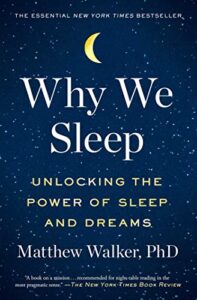I’ve spent a lot of time learning about health and nutrition over the last few years in an effort to improve and optimize my well-being. It’s changed what I eat with an increased emphasis on fewer processed foods, less refined carbohydrates, and more natural foods. It’s changed how I eat with intermittent fasting becoming a regular part of my daily routine. It’s made me more aware of how my eating habits affect my bodily functions, particularly my immune system and response.
One item I hadn’t spent a lot of time researching is sleep. I’ve known that getting an adequate, good night’s sleep is important. I’ve experienced the effects of poor sleep first hand, as I’m sure we all have at one time or another. What I didn’t realize is just how important sleep is, which is what researcher Matthew Walker covers in Why We Sleep: Unlocking the Power of Sleep And Dreams.
As a bit of background, Walker runs a Sleep Laboratory at the University of California Berkeley. He studies how sleep, primarily the lack of it, affects people. Some of the experiments focus on cognitive function such as learning and memory, some on motor skills, and others on general health. As you might expect, the results of his research show that sleep-deprived individuals perform significantly worse across the board, no matter what the experiment is.
In Why We Sleep, Walker starts with the basics, explaining the mechanics of sleep. He outlines the various stages of the human sleep cycle detailing what happens during each stage and its importance to the human body. He explains how long each stage takes, which leads to his conclusion that we need to be getting eight hours of sleep each night.
Unfortunately, the amount of sleep we get doesn’t work based on the law of averages. It’s not like a bank where you can run a deficit and then make things up with a few large deposits. He posits that once sleep is lost, the effects of that loss is permanent, and it accumulates over time. In other words, you can’t get the benefits of eight hours a sleep each night by sleeping 4-5 hours a night Sunday-Thursday and then binging on 12-15 hours a night on Friday and Saturday.
Walker’s research links all kinds of health issues to lack of sleep. Perhaps the most important are those associated with cancer and cognitive decline such as Alzheimer’s and dementia. For whatever reason, our current culture does not value sleep. In fact, it reveres those who forgo sleep to get more done. Walker contends it’s this culture that is at the root of the myriad of worsening health problems we are facing.
While Walker covers all the problematic outcomes from a lack of sleep, he doesn’t provide a cure for those struggling to get enough sleep each night. He outlines some basic guidelines and suggestions you can take to improve the quality of sleep such as reducing caffeine and alcohol intake, optimizing the temperature of your bedroom, and keeping a regular schedule. To be honest, I didn’t expect him to have all the answers since the reasons why we struggle to sleep are different for each of us. He provides links to resources and recommends getting professional help if you need it.
Why We Sleep is an excellent read, but it comes with a significant caveat. The book talks a lot about the mechanics of sleep. I found it interesting and informative. It inspired me to become more disciplined about my sleep regimen. Knowing how sleep works and its importance helped improve the quality of my sleep. However, if you struggle with sleep and have anxiety over sleeping, Why We Sleep could increase your levels of concern and worry. Instead of helping, it could have the opposite effect and make matters worse. Therefore, read with caution if you struggle with sleep, and keep an open mind about the concepts. Allow them to settle in your mind and use them as a way to manage your sleep habits without trying to force it.
I’ve put Why We Sleep into my Must Reads. It’s helped me to place more attention and focus on my sleep habits. So long as it doesn’t heighten your anxiety about any struggles you may have with sleep, I highly recommend it.
If you’d like a Cliff’s Notes version of the book, you can watch Matthew Walker’s TED talk embedded below. It’s not as thorough as the book, but it will give you a good feel for his research and provides a great overview for the material you’ll find in Why We Sleep.

